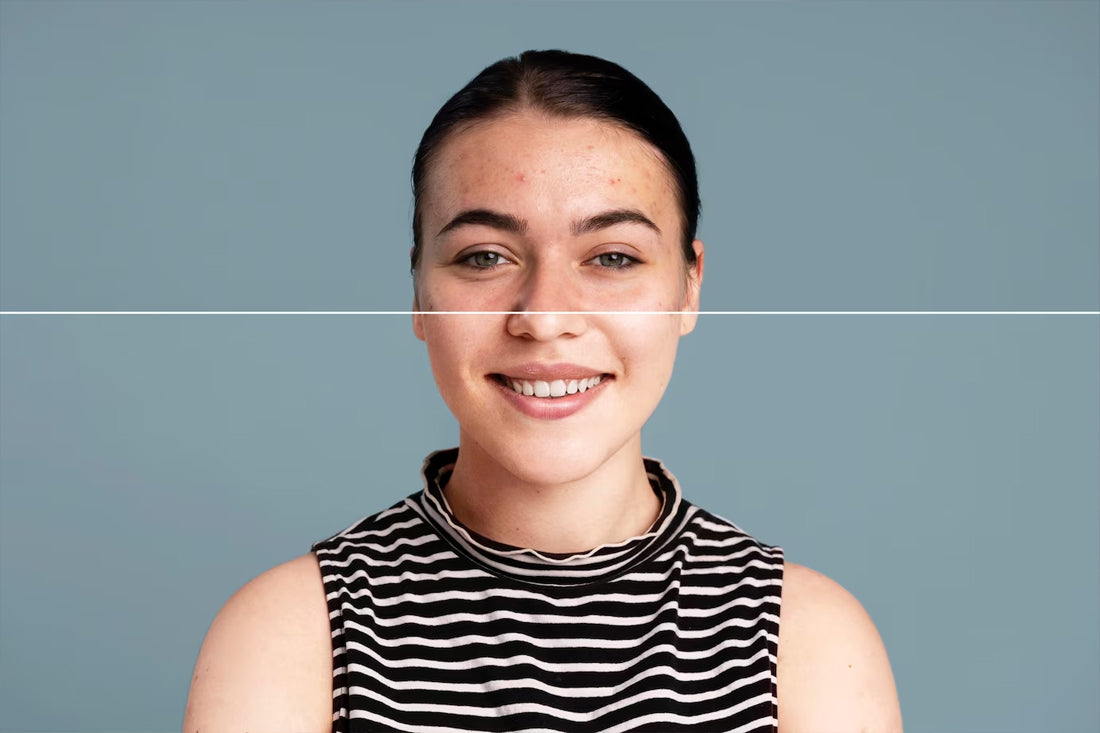Acne, a common skin condition that affects millions of people worldwide, can be a real confidence damper. Whether you're a teenager going through the stage of puberty or an adult dealing with unexpected breakouts, understanding the factors that contribute to acne and how your diet can influence it is crucial. In this comprehensive guide, we'll explore what acne is, its causes, and most importantly, how dietary changes can play a significant role in achieving clear and radiant skin.
What is Acne?
A dermatological condition characterized by the presence of pimples, blackheads, whiteheads, and sometimes painful cysts on the face, chest, back, or other parts of the body. These blemishes occur when hair follicles become clogged with oil, dead skin cells, and bacteria. While acne is not a life-threatening condition, it can have a significant impact on self-esteem and overall well-being.
What Causes Acne?
Several factors contribute to the development of acne, including:
- Excess Oil Production: Overproduction of sebum (skin oil) can clog pores and lead to acne.
- Clogged Pores: When hair follicles become blocked by dead skin cells and oil, it creates an environment where bacteria can thrive.
- Bacterial Infection: The presence of Propionibacterium acnes can worsen inflammation and acne lesions.
- Hormonal Changes: Hormonal fluctuations occurring during puberty, menstruation, or pregnancy can serve as triggers for acne.
- Dietary and Lifestyle Factors: Poor dietary choices, stress, and lack of proper skin care can exacerbate acne.
Can Dietary Changes Help Acne?
Yes, dietary changes can play a role in managing acne. While genetics and hormonal fluctuations also contribute, your diet can influence the severity and frequency of breakouts.
Foods to Avoid:
- High-Glycemic Foods: Processed and sugary foods, such as white bread, candy, and soda, can lead to insulin spikes, which may worsen acne.
- Dairy Products: Some studies suggest a link between dairy consumption and acne. Reducing dairy intake or choosing dairy alternatives like almond or soy milk may help.
- Fatty and Fried Foods: Greasy, fried foods can increase oil production in your skin, potentially exacerbating acne.
- Sugary Snacks: Cookies, cakes, and other sugary snacks can contribute to inflammation and acne.
- Excessive Coffee and Caffeinated Beverages: High caffeine intake can lead to dehydration, which may affect your skin's health.
Foods that Might Help to Improve Acne:
- Antioxidant-Rich Foods: Incorporate berries, green tea, and leafy greens into your diet to reduce inflammation and oxidative stress, two factors often associated with acne flare-ups.
- Omega-3 Fatty Acids: Fatty fish, flaxseeds, and walnuts are rich sources of anti-inflammatory omega-3s that can benefit acne-prone skin. The healthy fats help maintain balanced oil production in your skin and reduce the risk of clogged pores.
- Probiotic-Rich Foods: Yogurt, kefir, and fermented foods like kimchi and sauerkraut support gut health by providing beneficial bacteria. A healthy gut can contribute to improved skin conditions, as gut health is closely connected to overall skin health.
- Zinc-rich foods: Lean meats, nuts, and seeds provide essential zinc, a mineral crucial for skin health. Zinc plays a role in reducing inflammation and aiding in the healing of damaged skin, potentially helping to alleviate acne symptoms.
- Low-Glycemic Foods: Include whole grains like oats and quinoa, legumes such as lentils and chickpeas, and non-starchy vegetables like broccoli and spinach in your diet. These low-glycemic foods help regulate blood sugar levels, which can reduce the risk of insulin spikes associated with acne.
- Vitamins: Ensure you get an adequate intake of vitamins like A and E, which promote skin health and may contribute to acne improvement. Vitamin A supports skin cell production and repair, while vitamin E is an antioxidant that helps protect the skin from damage to free radicals.
General Tips for Managing Acne:
- Stay Hydrated: Drinking enough water helps maintain skin hydration.
- Maintain a Balanced Diet: Consume a variety of fruits, vegetables, whole grains, lean protein, and healthy fats.
- Proper Skincare: Establish a consistent skincare routine that includes gentle cleansing and non-comedogenic products.
- Stress Management: High-stress levels can exacerbate acne, so practice stress-reduction techniques like yoga or meditation.
Conclusion:
Achieving acne-free skin is a multifaceted journey that involves genetics, hormones, and skincare routines. However, by making smart dietary choices and adopting a holistic approach to your well-being, you can significantly improve your skin's condition and boost your confidence. Remember that individual responses to dietary changes vary, so be patient and consult with a healthcare professional or dermatologist for personalized advice on managing acne. Also, while diet can play a role in managing acne, it's unlikely to be a standalone solution. A holistic approach that includes proper skin care, stress management, and good hygiene is generally necessary for effective acne management.






